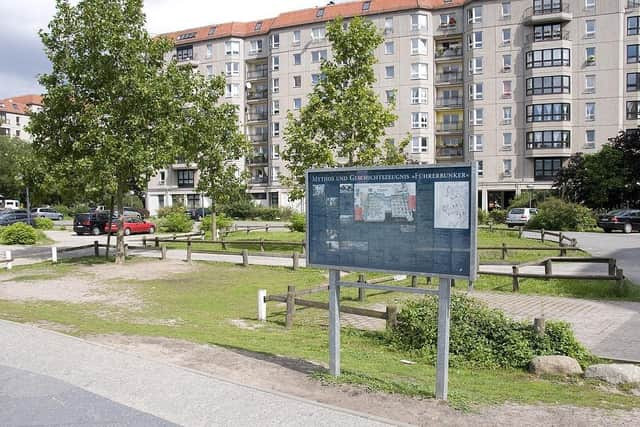A mental and physical wreck by the end of the war, Hitler had long lost contact with reality


In most wars there comes a point when defeat is so obviously inevitable for one side that its rulers endeavour to cut a deal with the victors.
Germany in the Second World War constitutes a conspicuous exception. Hitler, knowing the war was lost and complete destruction was in prospect, chose to fight on until Germany was practically obliterated. Why?
Advertisement
Hide AdAdvertisement
Hide AdIn the first instance, in January 1943 at the Allied conference at Casablanca President Roosevelt came up with the formula that the Allies would settle for nothing less than Germany’s ‘unconditional surrender’, the first time in modern history that a sovereign state had been offered no terms short of total and unconditional capitulation. This is an important component of the answer but not the whole explanation.


However, equally important was Hitler’s mindset which did not allow him to contemplate capitulation.
Both Roosevelt and Hitler’s thinking were shaped by the end of the Great War. Hitler subscribed to and assiduously propagated the potent and poisonous myth of the ‘Dolchstosslegende‘ (‘the stab in the back‘) that the German army did not lose the First World War on the battlefield but was betrayed by civilians who had ‘stabbed the army in the back’ and betrayed Germany in order to seize power.
Roosevelt’s policy was designed to ensure that the Germans would be left in absolutely no doubt that they had lost the war and could not play ‘the stab-in-the-back’ card again.
Advertisement
Hide AdAdvertisement
Hide AdHitler, partially blinded after a mustard gas attack in the Ypres salient, was convalescing in military hospital when news of the Armistice of November 11 1918 reached him. The psychological shock was almost unbearable and the humiliation personal.
He wrongly attributed responsibility for defeat to the Jews and the Bolsheviks. His desire for revenge for the national humiliation of 1918 became a central tenet of his world view. Under no circumstances would he countenance a repeat of 1918. It was preferable to go down fighting rather than negotiating a dishonourable or cowardly surrender.
Hitler appreciated that any negotiation would have been the end for him. Therefore he had no incentive to seek a negotiated peace, assuming that it was on offer (which it was not).
Furthermore his monstrous and destructive ego allowed him to conclude that if Germany was to be defeated in a second global war it would be because the German people had failed him and had not proved worthy of his leadership. Thus they were expendable and deserved their fate. For a man in thrall to the heroic myths of the Germanic past and Norse mythology, a quasi-Götterdämmerung (‘The Twilight of the Gods’) scenario, suggested by Wagner’s Ring cycle, proved simply irresistible.
Advertisement
Hide AdAdvertisement
Hide AdPeople often ask why did the Germans not rise up against the regime which was leading them inexorably into the abyss. A fair question but the answer is that after July 1944 there was no viable opposition to Hitler and that Hitler controlled an apparatus of state terror which was impervious to challenge.
From mid-January 1945, Hitler in the Führerbunker, surrounded by sycophants and sustained by dubious injections and medication prescribed by a quack, became a mental and physical wreck. By April 22 the Russians had encircled Berlin and by that stage Hitler’s contact with reality was at best tenuous.
Three days later the American and Russians armies met on the River Elbe, north-west of Dresden.
Hitler had originally toyed with establishing a ‘national redoubt’ in the Bavarian mountains and waging a guerrilla campaign against the Allies. This ought to be dismissed as sheer fantasy but, even if taken seriously, he had left it too late. He would have been hard pushed to get out of Berlin.
Advertisement
Hide AdAdvertisement
Hide AdHowever, Göring, who had been Hitler’s designated successor up to this point, did manage to flee to southern Germany and informed Hitler that he was willing to assume leadership of the Third Reich since he had opted to stay in Berlin. Himmler tried to open negotiations with the western Allies via the Swedish Red Cross ‘in order to salvage as much of Germany as possible from Russian invasion’. Hitler was enraged by what he regarded as the betrayal and treachery of two of his closest acolytes.
By April 26 Russian shells were falling on the bunker and even Hitler realised the end was near. On April 29 he married his long-term mistress Eva Braun, dictated his political testament, expelled Göring and Himmler from the Nazi Party and appointed Großadmiral Dönitz as his successor. He selected Dönitz in the belief that he possessed the necessary fanaticism to continue the fight to the bitter end.
Fortunately Dönitz, however reluctantly, fairly swiftly came to terms with the political and military realities confronting him.
Hitler’s testament concluded with a passage demonstrating the centrality of anti-Semitism to his worldview: ‘Above all I charge the leaders of the nation and those under them to scrupulous observance of the laws of race and to merciless opposition to the universal poisoner of all peoples, international Jewry.’
Advertisement
Hide AdAdvertisement
Hide AdThe following day Hitler withdrew to his private rooms in the bunker where he shot himself and his wife took poison. Goebbels and his family, who insisted on staying with Hitler to the end, also took their own lives. Magda Goebbels’ rationale for taking her own life and those of her children was that ‘the world after the Führer and National Socialism would no longer be worth living in’. For Hitler suicide was the only way out and had become a timing issue so that he could avoid capture by the Russians.
Members of the SS took themselves off to the Tiergarten (the zoo) to blow their brains out.
Late on May 1 German radio announced Hitler’s death, dishonestly claiming that he had fallen ‘at the head of heroic defenders of the Reich capital’.
On May 2 Russian troops raised the Soviet flag above the ruins of the Reichstag. Within a week of Hitler’s death the war in Europe was at an end.